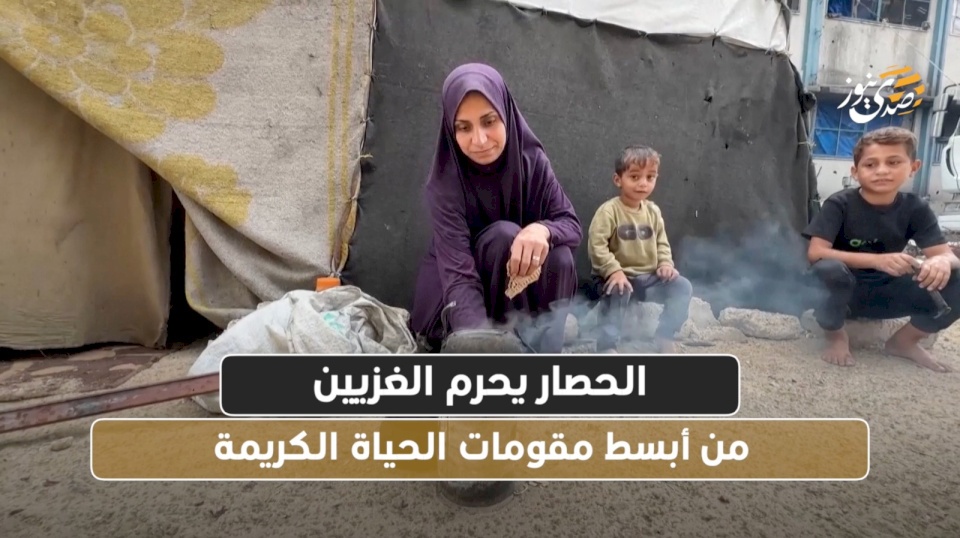
Video: The Siege Denies Gazans the Most Basic Elements of a Decent Life
SadaNews Report - In light of the harsh living conditions in the Gaza Strip, economic, psychological, and political crises are escalating day by day due to the ongoing Israeli aggression and tight siege on the area. Among the most pressing crises that have emerged recently is the issue of obtaining firewood for cooking, after the occupation forces prohibited the entry of domestic gas for many months, a situation that regresses the region years back and deprives its residents of their most basic rights to life. This has forced citizens to seek harsh and costly alternatives. The crisis is no longer limited to the difficulties of cooking or high prices, but has extended to one of the most important Palestinian symbols, the olive tree, which represents heritage and a deep-rooted identity in the Palestinian land.
Um Ammar Al-Huwaiti, a displaced woman living in one of the camps, told SadaNews: "I buy firewood daily for cooking, but after the prices increased, it has become very difficult to obtain it, sometimes forcing me to reduce meals. Cooking on fire has worn me out and caused me respiratory problems and suffocation." She added that the firewood crisis is no longer just a struggle for survival but threatens people’s lives, as one Palestinian was killed this morning while trying to gather firewood in the eastern areas after the olive groves were razed.
For his part, citizen Majid Al-Dhahri said he had to sell and break his bed set in order to cook and obtain some money, adding that he sometimes goes to the neighboring bakeries to save some money due to his inability to buy firewood.
In the same context, young Mahmoud Al-Rubai from Gaza City, who was displaced to the southern part of the strip, told SadaNews: "I had to sell and collect firewood from different places to make some money. While gathering firewood, I met young men who lost their lives due to targeted fire; the situation has become fraught with danger." He added that some citizens have resorted to cutting down olive trees to use them for cooking or selling them to secure their daily sustenance.
Citizen Muhammad Mahdi, on the other hand, expressed deep sadness over having to cut down a decades-old olive tree due to the lack of gas and wood, saying: "I found no alternative, so I had to cut down the tree my father planted long ago. I also broke some wooden furniture in the house for cooking." Mahdi appealed through SadaNews to delegations and humanitarian organizations to prioritize fuel and gas in relief efforts, saying: "The fire has exhausted us and caused us respiratory diseases and suffocation, we want an urgent solution to this crisis."
On the other side, citizen Abdullah Barik is trying to bring in quantities of olive branches to his home after obtaining them from trees that the occupation has demolished or from citizens who had to cut them down. He told SadaNews: "I feel deeply saddened about the cutting down of these ancient trees, as they represent our heritage and Palestinian identity, but unfortunately, we had to burn them for bread and cooking."
In this painful scene, olive trees – a symbol of Palestinian resilience – are turned into fuel for survival, at a time when the residents of the Gaza Strip are living through one of the most severe humanitarian and living crises in their modern history. Amidst all these tragic conditions, the resilience of Gazans is evident, even as they are deprived of the most basic elements of life.
This report was completed with the support of the European Union.

High-level sources reveal to SadaNews: Washington seeks to hold a Gaza Reconstruction Conf...

Israel Hayom: Israel-UAE Relations in Continuous Decline

Yedioth Ahronoth: Israel Spends Tens of Millions on Armed Gangs in Gaza

SadaNews Obtains Its Literal Article: Olmert: Israel Supports Ethnic Cleansing in the West...

Sources to SadaNews: Israel Refuses to Grant the National Committee Access to Gaza

Russian Newspaper Reveals: Why Trump Backed Down from Striking Iran?

In Pictures: Details of the Verdict Issued Against Nazmi Muhanna and His Wife

